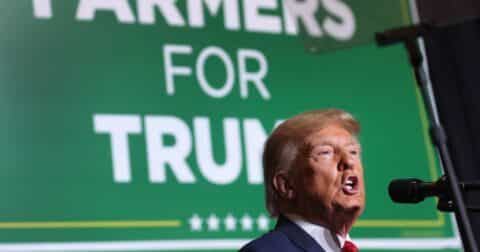News
A Major Agreement to Protect the Amazon Is Falling Apart After 20 Years
Climate•6 min read
Explainer
His second term is bad news for combating climate change.


Words by Seth Millstein
Donald Trump has been declared the winner of the 2024 presidential election. His second ascension to the presidency will have major implications in every area of policy, and the environment is no exception. What sort of policies can we expect to see on climate, the environment and factory farms during Trump’s second term?
While it’s too soon to answer that question with any precision, Trump has always been hostile toward efforts to fight climate change and protect the environment. Many actions he took during his first term made this abundantly clear, and during his four years out of office, he continued to rail against environmentalism and climate-forward policies, including the connection between red meat and climate pollution.
There’s no reason to suspect that he’ll do anything different during his second term; in all likelihood, Trump will pursue more policies that hurt efforts to combat climate change. But what exactly might these policies look like?
Trump has stated many times that he doesn’t think global warming is real, calling it a “hoax,” “nonsense” and “bullshit” on several occasions before becoming president. In 2012, he went a bit further and claimed that the entire concept of climate change “was created by and for the Chinese to make the U.S. manufacturing less competitive.”
Trump’s position on climate change doesn’t appear to have changed in recent years. In a speech three days before the 2024 election, Trump quipped, “who the hell cares” about rising sea levels, and pledged to “terminate the green new scam.” This is presumably a reference to the Green New Deal, an ambitious set of policy proposals aimed at reducing greenhouse emissions and transitioning America to 100 percent renewable energy by 2030.
But although a few of the individual proposals in the Green New Deal have been enacted through separate pieces of legislation, the Green New Deal itself is not law. It’s never even passed the Senate, let alone landed on the president’s desk, so it’s unclear what Trump means when he says he wants to “terminate the green new [deal].”
The 2024 Republican Party platform makes no mention of climate change or global warming, let alone propose any policies to combat it. This isn’t a surprise, as Republicans have traditionally been skeptical of whether anthropogenic climate change is even happening.
The platform may include a general pledge to “cut costly and burdensome regulations,” though, which presumably includes environmental regulations. This, too, is no surprise; during his first term, Trump rolled back over 100 rules aimed at fighting climate change, reducing air and water pollution, limiting carbon emissions and protecting the environment.
One specific thing Republicans have pledged to do is withdraw the Biden Administration’s electric vehicle rule, which imposes limits on tailpipe emissions from cars. The rule was meant to ensure that by 2032, the majority of consumer cars and light trucks sold in the U.S. are either electric or hybrid vehicles.
Earlier in the year, the EPA estimated that this policy would reduce carbon dioxide emissions by over seven billion tons, and in doing so, provide $13 billion in public health benefits. Withdrawing the rule would eliminate these benefits and effectively increase carbon emissions.
Trump himself said during the campaign that he’ll “end the electric vehicle mandate on day one” of his presidency. In actuality, nobody has imposed an electric vehicle mandate on anyone, so it’s again not entirely clear what he’s talking about. That said, his general hostility toward electric vehicles makes it fairly likely that he’ll take aim at Biden’s electrical vehicle rule.
Every five years, Congress is tasked with passing a new version of the Farm Bill, an enormous package of legislation that governs American agriculture and facilitates the smooth functioning of America’s food systems. Democrats and Republicans usually present competing versions of the Farm Bill ahead of its vote, and that’s no different this time.
What exactly the next Farm Bill looks like will depend largely on Congress, so this isn’t entirely in Trump’s hands. Nevertheless, having a Republican in the White House and — if Republicans take both the House and Senate — means the final bill will almost certainly be closer to the Republican proposal than the Democratic one.
The GOP’s Farm Bill would repeal Proposition 12, a landmark animal welfare law that banned the extreme confinement of livestock in California, as well as the in-state sale of any animal products produced using extreme confinement. Repealing Prop 12 would benefit the meat industry, as well as pro-factory farm trade groups like the Farm Bureau and the National Pork Producers Council. It would also water down the Inflation Reduction Act’s funding for conservation projects by removing a requirement that said projects benefit the climate, and cut food stamps payments.
Bills go through a lot of changes before they pass, so none of this is even remotely set in stone. But Trump’s Republican allies in Congress will certainly be pushing him to sign a Farm Bill that includes these provisions.
Before the election, oil industry lawyers drafted a number of executive orders on energy policy that they intended to present to Trump if he won. This was an aspirational effort that outside actors took without Trump’s blessing; they don’t all necessarily represent Trump’s views, and there’s no guarantee he’ll sign any of them.
Nevertheless, Trump and the Republican Party have traditionally been aligned on energy policy, so these executive orders do at least offer a glimpse into the kind of policy changes Trump’s allies will be pushing him to implement.
One of such order would do something Trump has already pledged to do: withdraw the U.S. from the Paris Agreement — again. Trump already did this in 2019, but Joe Biden reversed his decision in 2021 and re-entered the U.S. into the accords. In June, however, Trump said that he’ll pull out of the agreement once again as president.
The Paris Agreement is a 2015 pact between 195 countries to reduce greenhouse gas emissions within their respective borders. The overall goal is to prevent global temperatures from rising 1.5 degrees celsius above pre-industrial levels by the end of the century; each signatory has its own emissions targets, and is required to report back regularly to the other countries on the progress they’ve made.
Over a dozen American cities have pledged to adopt the Paris Agreement on their own if the U.S. pulls out of the agreement, including the five largest cities in the country: New York, Los Angeles, Chicago, Houston and Phoenix.
What would potentially be even more impactful would be withdrawing America from the United Nations Framework Convention on Climate Change (UNFCCC), which is reportedly also among the oil industry’s proposed executive orders. This 1992 treaty serves as a framework through which future climate change agreements, such as the Paris accords, are made. Project 2025, which we’ll discuss further below, also recommends that Trump withdraw the U.S. from the UNFCCC.
Biden was able to re-enter America into the Paris accords with the stroke of a pen, but re-ratifying the UNFCCC would require approval from a supermajority of the Senate. It’s difficult enough to get 67 senators to agree on anything, let alone an international treaty about global warming. If Trump withdraws from the UNFCCC, it will be harder to re-join the pact, and the withdrawal would directly impact future attempts by America to join international agreements on climate change.
During the campaign, a right-wing think tank called the Heritage Foundation released Project 2025, a 900-page policy manifesto intended to serve as a blueprint for Trump’s second term. Though not an official Trump campaign policy document, it’s not far removed from him: According to a New York Times analysis, over 140 people who worked on Project 2025 also served in Trump’s administration, his 2016 transition team or his campaign.
Moreover, the Heritage Foundation says that Trump enacted 64 percent of the policies it recommended to him in 2016, so Project 2025 may well offer some more clues as to how he’ll address climate issues during his second term.
Project 2025 recommends that Trump eliminate offices in the Department of Energy that are devoted to researching and implementing clean energy policies, such as the Office of Clean Energy Demonstration (OCED). It also urges him to scrap the Inflation Reduction Act’s tax credits and subsidies for green energy companies, and eliminate federal energy efficiency requirements for household appliances.
There are many other climate-related policy proposals in Project 2025, and conservation groups agree that by and large, they’d be disastrous for the environment.
After his own campaign for president fizzled out, environmental lawyer Robert F. Kennedy emerged as one of Trump’s most high-profile supporters, with Trump embracing Kennedy’s Make America Healthy Again slogan.
Kennedy has said that Trump “promised [him] control of the public health agencies” if he won; according to Kennedy, this includes the Department of Health and Human Service and its sub-agencies, such as the Centers for Disease Control and Federal Drug Administration.
It’s unclear if Trump actually made this promise, and if he did, it’s unclear whether or not he’ll honor it, though he did mention Kennedy during his acceptance speech early Wednesday morning. What is clear is that Trump enthusiastically embraced Kennedy after receiving his endorsement, campaigning with him and co-opting some of his talking points. That being the case, it’s worth looking at Kennedy’s views on climate and environmental issues.
Kennedy’s policy proposals include banning certain pesticides and chemicals, directing more crop subsidies to fruits and vegetables and banning natural gas exports. He’s also criticized the Biden administration for subsidizing green energy technology, and opposes a ban on fracking.
It’s worth noting that while Kennedy presents himself as an environmentalist, many of his former colleagues dispute that this is still the case. Some of the biggest environmental groups, including the Sierra Club, the League of Conservation Voters and the Natural Resources Defense Counsel, signed a letter in April calling Kennedy a “dangerous conspiracy theorist and science denier,” in part due to his opposition to vaccines.
There is, however, a major caveat to all of this: Despite Kennedy and Trump’s political alliance, Trump implemented several policies during his first term that were the exact opposite of what Kennedy is now proposing.
For instance, Kennedy says he wants to ban chlorpyrifos, a pesticide that some studies have linked to cognitive impairment in children; yet Scott Pruitt, a Trump appointee, actively blocked a proposal to ban chlorpyrifos during his first term. Kennedy has also endorsed increasing the amount of vegetables in school lunches, but Trump’s USDA lowered the fruit and vegetable requirements for school lunches.
It’s still possible that Trump will appoint Kennedy to lead one public health agency or another, and that in this position, Kennedy will enact some of his favored policies. But given Trump’s own policy record, it’s worth taking Kennedy’s supposed influence over the incoming president with a heavy grain of salt.
All of the available evidence suggests that in his second term, Trump will seek to roll back environmental protections, oppose federal efforts to fight global warming and pull America back from international efforts to do the same.
There’s no guarantee that he’ll succeed in all of this; Congress, the courts and even members of his own administration might push back against his anti-environment proposals. Nevertheless, that is almost certainly what he’ll be proposing when he assumes the White House in January.